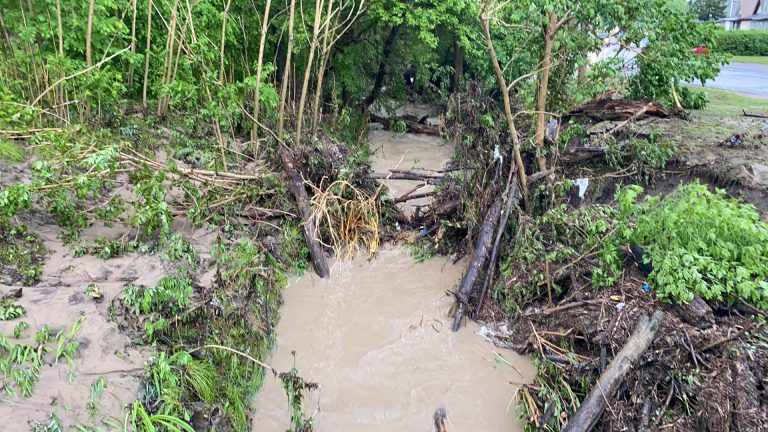DePUE – This year’s spring brought high precipitation levels across the state, and each year flooding remains a concern along the state’s rivers. Environmental advocates argue that increased flooding is just one of the results of climate change that tend to impact people of color and low-income communities more severely.
One example of that is in DePue, a small village along the Illinois River which recently experienced a major flash flood that affected a large swath of the largely low-income, Latinx community. The village is now struggling to secure funding to repair the damage to an underground tunnel to prevent a flash flood from happening again.
Illinois Newsroom environmental reporter Lecia Bushak recently spoke with Keenan Campbell, Bureau County’s emergency management agency director, about the effects of the flood.
This interview has been lightly edited and condensed for clarity.
Lecia Bushak: Keenan, DePue is one of many towns along the Illinois River that faces a flood risk every year. Tell me a little more about the most recent flood at the end of May.
Keenan Campbell: Normally we have river flooding day-to-day, but what we’re dealing with now in DePue is a flash flood. We had 180 homes affected just in this area. It literally came within an hour, they had three feet of water. The road literally had a foot of mud in certain areas, it looked like a mudslide. In my seven years at Bureau County, we haven’t had flooding like that ever.
LB: We know that DePue has had a lot of environmental pollution concerns over the years. Does that play a role at all in everything that’s going on?
KC: From my perspective, it played a huge role, because we couldn’t bring damage assessment in until Illinois EPA told us it was safe. So DePue is a Superfund site, it’s long-standing, they have the New Jersey zinc plant there. The town’s been contaminated for a long time, and with the Superfund designation, the U.S. EPA takes care of working with the owner to try to clean the property up. But that was a huge concern of ours, because I’m putting people there to do damage assessment and I certainly don’t want them sick. Normally when we [manage] flooding, we clean it up, we put the dirt wherever. With that site, we couldn’t even take the dirt out of town. Because it has contamination or it could potentially have contamination, we couldn’t remove it from the community.

LB: What’s the situation on the ground now?
KC: Right now, we did a damage assessment to go talk to every single resident to figure out where we’re at damage-wise. We’ll take that information, give it to the State of Illinois, and then we’ll ask for a federal declaration. That also brings in state declaration and any other assistance they can provide. Obviously, what happened in DePue, it will continue. We know the village obviously doesn’t have the funds to support a project of this scope, because we’re at over $25 million in costs just to replace or try to repair [the damage]. State or federal funds—that’s the only option that DePue truly has. They’re not a wealthy community, so it’s nearly impossible for them to fund it.
LB: To what extent did the water and mud reach people’s homes?
KC: Absolutely. It was in their basements, it was on their first floors, their driveways. It was everywhere. But these folks that live there are used to dealing with the contaminants—they live there. Most of them self-solved. We didn’t have any unmet needs the first night. They went and stayed with relatives, or they cleaned their house up enough that they were okay to stay there. I can’t tell you they were cleaned to the standard I would like to see, because they weren’t. But we provided flood kits for the citizens that night and the next day so they could have bleach, buckets, mops, all that stuff. The next day they were pressure-washing their homes and yards and cleaning it up.
LB: Do you think people going out and cleaning up the effects of the flood on their own—is that exposing them more to the contaminants in the soil?
KC: It could. The Superfund site is actually farther east, but we had to treat everything as suspect. Part of the Superfund site was to remove 18 inches of top soil in all of the homes, so you have to treat the top 18 as contaminated no matter what. Even though this flooding may not have been contaminated at all, we treated it as suspect. We were cautious with how [we] went through—we didn’t go into any homes, just to make sure my guys were safe.
LB: Keenan, are you expecting more flooding? In terms of this flash flooding issue, is there a chance it could happen again and exacerbate the problem?
KC: It could happen again tomorrow. I would love to think that it’s just a freak occurrence that’s not going to happen for 100 years, but we’re trying to be more proactive. Obviously we need to build a solution, so the engineers that I’ve been working with have been trying to design a solution for DePue that will last 100 years. What they told me is it would take 18 months of construction from shovel-ready funded to completion. Hopefully the state will fund it, time will tell. Because it needs to be done. Never in my career I thought I would see a driveway with eight feet of water coming out of it because of a blockage or a failure of the system. It was definitely a freak incident, but something that could repeat at any time.

